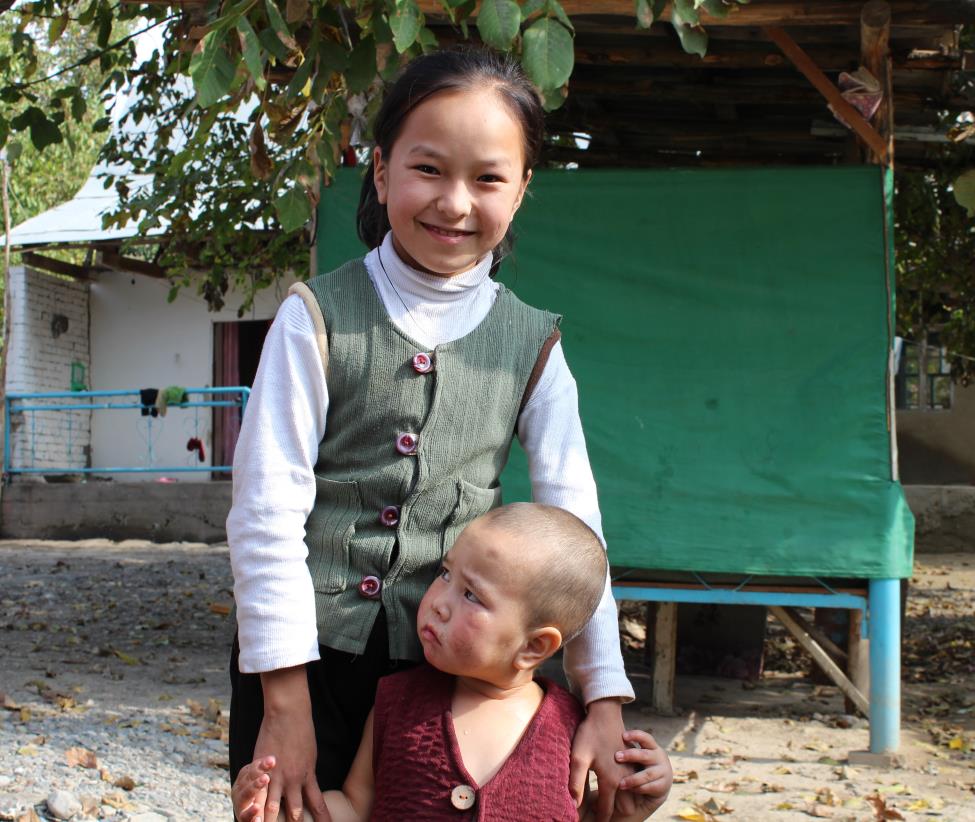
“I look at my future with pride and confidence”
How social protection and agriculture help poor rural households build resilience
©FAO/Vyacheslav Oseledko
23/12/2019
Dinara Eshimbetova is a wife and mother of five who lives in the south of the Kyrgyz Republic. Her eldest son has just turned 20, while her youngest child is only 3 years old.
The job market is very limited in rural Kyrgyzstan, so both Dinara and her husband work as subsistent, smallholder farmers. However, their land plot was originally too small and their crop too limited to meet the immediate needs of their rapidly growing family. Even when Dinara applied for a pro-poor state-provided cash benefit, she was still not certain of her family’s tomorrow.
And then the crisis hit.
In autumn 2016, when Dinara’s smallest son was just born, a mudflow destroyed their whole sunflowers harvest, which she and her husband were hoping to sell. During the hardest months of the year, the family was left with almost nothing – the happiness that came with the birth of their youngest son was quickly replaced with uncertainly.
“We lost all the income we were hoping to get,” she lamented. “I did not know what to do, how to feel about my children. My husband was thinking of going to Bishkek or Russia to earn at least something, but we could not even find the money for his ticket, so he decided to stay and do some construction work here.”
Dinara thought it was time for her to act. The moment she learned about FAO’s cash plus project, she decided to take this opportunity. The idea behind the Russian-funded project was to provide poor, rural households, who benefit from social protection in the form of cash transfers, with additional support in the form of gardening tools, seeds, agricultural training, and nutrition education to help them diversify their income, improve their food security and nutrition, and become more resilient in the long run.


©FAO/Karina Levina
“FAO provided us seeds for crops, like cucumbers and tomatoes, which sell well in this area, as well as crops like spinach, lentils, broccoli, pumpkin, and others, which are good for our nutrition,” she explained. “We also received tunnel greenhouses to grow crops off-season, when no one else is producing anything yet.”
Dinara not only got tools, but also the skills on how to produce more quality food in a more sustainable manner. That made her stand out among other smallholder food producers in her village and attract customers from fellow villagers.
“At first, I did not plan to sell any products, I was only focused on feeding my family. But when I started growing a significant surplus, I thought, Why not sell it? And it worked! My neighbors were my first customers. They were so impressed with my cucumbers and tomatoes that they stopped going to the market to purchase them, always returning to me for new ones,” she happily noted.
Although Dinara does not yet make big money, the crops are a great support for her and her family to not only meet their daily needs, but also to plan for the future. “Of course, I primarily ensure that my family has enough to eat, especially during the winter period, and only then I do start selling the surplus,” she pointed out. “I spend the money I earn on buying additional, healthier, and more diverse foods, such as fruits, berries, and vegetables, but not just that. For example, my eldest son now studies at the vocational training college in the regional center 50 kilometres away from us, because we can now afford his transportation costs. Before joining the FAO pilot, I would never imagine that we would be able to afford it.”

©FAO/Vyacheslav Oseledko
Now Dinara thinks she is better prepared for the future and is ready to overcome any difficulty her family may face. “Before joining the pilot, I spent all the money I had from the state cash benefit on food. Now I can even save a bit. I feel that if my elder sons decide to get married, or I happen to have another baby, I am ready.”
However, Dinara and her husband do not intend to stop at what they have achieved. They are now thinking of expanding their small business to become even more financially independent. “We are saving some funds now to be able to invest in drip irrigation or another greenhouse next year. I know it will be a huge expense for us, but the return is likely to be bigger. And even if it will not happen fast, I am now confided in my tomorrow,” she proudly exclaimed.
The pilot is a part of the comprehensive project “Developing capacity for strengthening food security and nutrition in selected countries of the Caucasus and Central Asia,” funded by the Russian Federation.
Related links
Learn more
